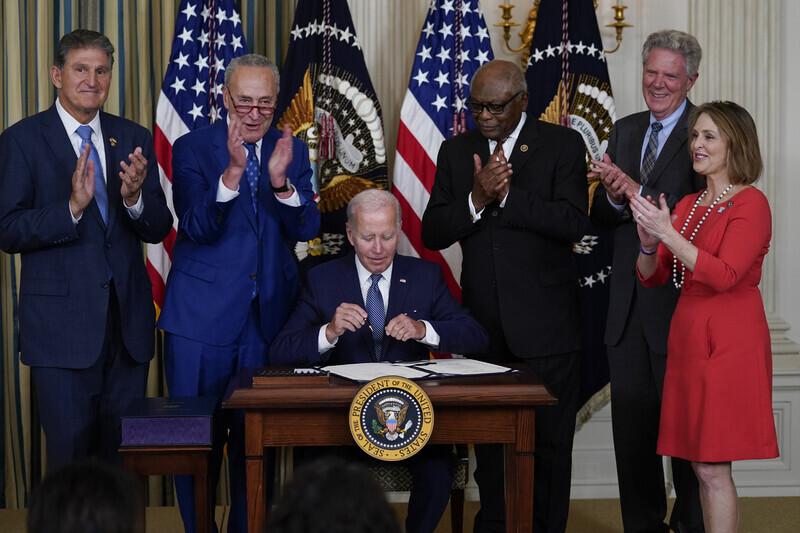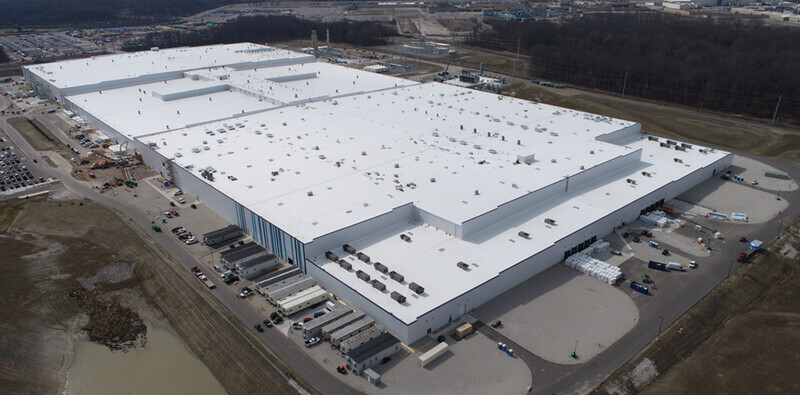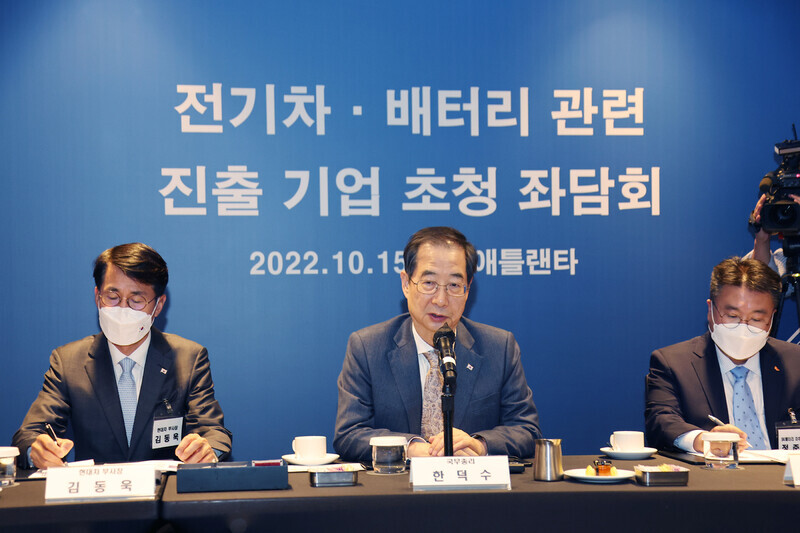hankyoreh
Links to other country sites 다른 나라 사이트 링크
Korean battery sector tense after Chinese firm slips by IRA and heads to US

The decision by a China-based battery company to invest large amounts in the US while the US has been trying to exclude China from the electric vehicle (EV) supply chain through its Inflation Reduction Act (IRA) has been drawing attention.
There have been many predictions pointing to how the IRA will lead to EV production being shifted to domestic US companies, but this latest case seeto ms point in the opposite direction.
According to the battery industry on Tuesday, after China-based battery maker Gotion High-Tech established a joint venture with Germany’s Volkswagen, they invested US$2.36 billion to build a battery materials factory in the US state of Michigan.
Gotion is a Chinese EV battery manufacturing company. In 2020, Volkswagen bought a 26% stake in the company, becoming its largest shareholder.
In the US domestic battery industry, Gotion and Volkswagen’s joint venture in the country and its accompanying big money has prompted various interpretations. This is because it remains unclear whether the joint venture with Gotion should be seen as a venture with a Chinese company or a Chinese subsidiary of a German company.
According to the IRA, Chinese companies cannot receive subsidies in the US even if they meet the conditions specified by law, such as manufacturing locally in the US.
“There is room for interpretation regarding the scope of the application of the law, so we need to keep watching future developments,” says Park Jae-bum, senior researcher at POSCO Research Institute (POSRI).
“Companies with a partial stake in China are pushing to enter the North American market by establishing joint ventures. But if we look at the purpose of the IRA, the chances are big that electric vehicles using batteries or materials made by companies that fall under the ‘foreign entity of concern’ regulation will not receive any subsidies,” Park explained.

Experts are particularly paying attention to the different interests of the central government and individual states. For example, the state of Michigan decided to provide 1 trillion won in incentives to Gotion. Similarly, Sen. Raphael Warnock proposed an amendment to the IRA to help pave the way for Hyundai Motor Group to build an EV and battery plant in his home state of Georgia.
“The positions of the state and federal governments, who both want to create more jobs, may differ. State governments usually go along with the major federal guidelines, but, if it is in the interests of their state, they can offer corresponding incentives,” Cheon Seo-hyung, a researcher at the LG Economic Research Institute, said.
Meanwhile, some also argue that Chinese companies have shown confidence that they can maintain price competitiveness without receiving subsidies from the US government.
“Based on cost competitiveness, it seems that this company made the conclusion that it would be possible to do business in the US without receiving subsidies,” an official at a domestic battery manufacturer told the Hankyoreh over the phone.
“There are frequent reports from Chinese subsidiary companies pointing to how Chinese battery manufacturers are preparing to enter the US market on the premise of not receiving subsidies,” another official at a battery manufacturer said.

Experts are also suggesting Chinese companies take back their rosy predictions that South Korean battery and material manufacturers will be able to monopolize the US market thanks to the IRA.
“There are surging expectations that South Korean battery manufacturers could monopolize the US market, and, after the law was passed, everyone is announcing plans to invest in the US,” a battery expert who asked to remain anonymous told the Hankyoreh over the phone. But the official added that it still remains to be seen whether the US will leave the current situation, which only benefits one country, as is.
“The details of the bill have not yet been released and there is still a lot of uncertainty, so it is necessary to exercise caution. The subsidy policy could also be easily withdrawn depending on policy stances,” the expert said.
By Ahn Tae-ho, staff reporter
Please direct questions or comments to [english@hani.co.kr]

Editorial・opinion
![[Editorial] Perilous stakes of Trump’s rhetoric around US troop pullout from Korea [Editorial] Perilous stakes of Trump’s rhetoric around US troop pullout from Korea](https://flexible.img.hani.co.kr/flexible/normal/500/300/imgdb/original/2024/0509/221715238827911.jpg) [Editorial] Perilous stakes of Trump’s rhetoric around US troop pullout from Korea
[Editorial] Perilous stakes of Trump’s rhetoric around US troop pullout from Korea![[Guest essay] Preventing Korean Peninsula from becoming front line of new cold war [Guest essay] Preventing Korean Peninsula from becoming front line of new cold war](https://flexible.img.hani.co.kr/flexible/normal/500/300/imgdb/original/2024/0507/7217150679227807.jpg) [Guest essay] Preventing Korean Peninsula from becoming front line of new cold war
[Guest essay] Preventing Korean Peninsula from becoming front line of new cold war- [Column] The state is back — but is it in business?
- [Column] Life on our Trisolaris
- [Editorial] Penalties for airing allegations against Korea’s first lady endanger free press
- [Editorial] Yoon must halt procurement of SM-3 interceptor missiles
- [Guest essay] Maybe Korea’s rapid population decline is an opportunity, not a crisis
- [Column] Can Yoon steer diplomacy with Russia, China back on track?
- [Column] Season 2 of special prosecutor probe may be coming to Korea soon
- [Column] Park Geun-hye déjà vu in Yoon Suk-yeol
Most viewed articles
- 160% of young Koreans see no need to have kids after marriage
- 2‘Free Palestine!’: Anti-war protest wave comes to Korean campuses
- 3Behind-the-times gender change regulations leave trans Koreans in the lurch
- 4In Yoon’s Korea, a government ‘of, by and for prosecutors,’ says civic group
- 5[Editorial] Perilous stakes of Trump’s rhetoric around US troop pullout from Korea
- 6Korean president’s jailed mother-in-law approved for parole
- 7Nuclear South Korea? The hidden implication of hints at US troop withdrawal
- 8[Photo] ‘End the genocide in Gaza’: Students in Korea join global anti-war protest wave
- 9Yoon’s revival of civil affairs senior secretary criticized as shield against judicial scrutiny
- 10Family that exposed military cover-up of loved one’s death reflect on Marine’s death